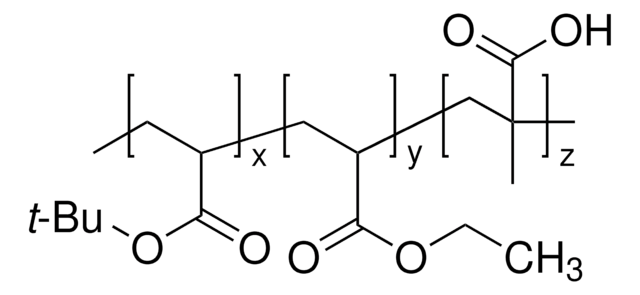376914
Poly(methyl methacrylate-co-methacrylic acid)
average Mw ~34,000 by GPC, average Mn ~15,000 by GPC
Synonym(s):
Poly(methacrylic acid-co-methyl methacrylate)
About This Item
Recommended Products
feed ratio
1:0.016 (methyl methacrylate:methacrylic acid)
mol wt
average Mn ~15,000 by GPC
average Mw ~34,000 by GPC
inherent viscosity
0.19 dL/g(lit.)
transition temp
Tg 105 °C
InChI
1S/C5H8O2.C4H6O2/c1-4(2)5(6)7-3;1-3(2)4(5)6/h1H2,2-3H3;1H2,2H3,(H,5,6)
InChI key
IWVKTOUOPHGZRX-UHFFFAOYSA-N
Looking for similar products? Visit Product Comparison Guide
Application
- Ultrafine Nanoparticles of Poly(Methyl Methacrylate-co-Methacrylic Acid) Loaded with Aspirin: This study focuses on the preparation and potential therapeutic applications of biocompatible nanoparticles loaded with aspirin, highlighting their suitability for medical use (López-Muñoz et al., 2019).
- Biocompatible and biodegradable ultrafine nanoparticles of poly (methyl methacrylate-co-methacrylic acid) prepared via semicontinuous heterophase: Discusses the synthesis of biodegradable nanoparticles for potential biomedical applications, emphasizing their eco-friendly nature and suitability for drug delivery systems (Saade et al., 2016).
- Synthesis and characteristics of poly(methyl methacrylate‐co‐methacrylic acid)/poly(methacrylic acid‐co‐N‐isopropylacrylamide) thermosensitive semi‐hollow latex: Explores the unique properties of thermosensitive latex particles for advanced material applications, potentially useful in smart drug delivery systems (Lee et al., 2014).
- Preparation and release behavior of poly(methyl methacrylate-co-methacrylic acid)-based electrospun nanofibrous mats loaded with doxorubicin: Examines the use of polymeric nanofibers for controlled drug release, particularly for cancer treatment, demonstrating the versatility of poly(methyl methacrylate-co-methacrylic acid) in pharmaceutical applications (López-Muñoz et al., 2023).
Storage Class Code
11 - Combustible Solids
WGK
WGK 1
Flash Point(F)
Not applicable
Flash Point(C)
Not applicable
Personal Protective Equipment
Choose from one of the most recent versions:
Already Own This Product?
Find documentation for the products that you have recently purchased in the Document Library.
Customers Also Viewed
Articles
To keep pace with Moore′s Law, there is a continuing need in the semiconductor industry to achieve higher circuit density in microelectronic devices.
Self-assembled monolayers (SAMs) have diverse applications; article compares benefits of alkylthiolates on gold SAM systems.
Self-assembled monolayers (SAMs) have diverse applications; article compares benefits of alkylthiolates on gold SAM systems.
Self-assembled monolayers (SAMs) have diverse applications; article compares benefits of alkylthiolates on gold SAM systems.
Our team of scientists has experience in all areas of research including Life Science, Material Science, Chemical Synthesis, Chromatography, Analytical and many others.
Contact Technical Service






